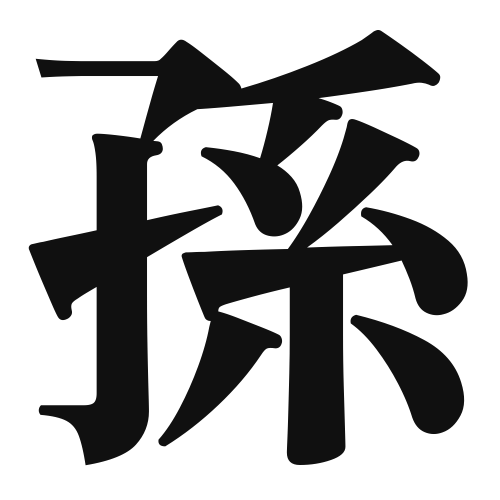1. Overview of Meaning
The kanji “孫” (pronounced “son” in Japanese) means “grandchild” or “descendant.” It refers to the children of one’s children, representing the next generation in a family lineage.
2. Formation and Radical
Formation of the Kanji: The kanji “孫” is a phonetic compound (形声文字), which combines the meaning of the radical with a phonetic component. The left part “子” (meaning “child”) indicates the concept of offspring, while the right part “尊” contributes to the pronunciation.
Radical: The radical of “孫” is “子,” which is commonly associated with children or offspring in various kanji.
3. Examples of Usage
Common Words and Phrases:
- 孫 (まご, “mago”) – grandchild
- 孫娘 (まごむすめ, “magomusume”) – granddaughter
- 孫息子 (まごむすこ, “magomusuko”) – grandson
Example Sentences in Daily Conversation:
- 私の孫はとてもかわいいです。 (わたしのまごはとてもかわいいです。) – My grandchild is very cute.
- 孫たちと遊ぶのが楽しみです。 (まごたちとあそぶのがたのしみです。) – I look forward to playing with my grandchildren.
4. Synonyms and Antonyms
Similar Kanji:
- 子 (こ, “ko”) – child; refers to a direct offspring, while “孫” refers specifically to grandchildren.
- 弟 (おとうと, “otōto”) – younger brother; while not directly related, it also pertains to family relationships.
Antonyms:
- 親 (おや, “oya”) – parent; this is the opposite in terms of generational hierarchy.
5. Cultural and Historical Background
Relation to Japanese Culture: In Japanese culture, family lineage and respect for elders are highly valued. The concept of “孫” emphasizes the importance of family continuity and the bond between generations.
Proverbs and Idioms:
- 「孫の手」 (まごのて, “mago no te”) – literally “grandchild’s hand,” refers to a tool used to scratch one’s back, symbolizing care and support from younger generations.
